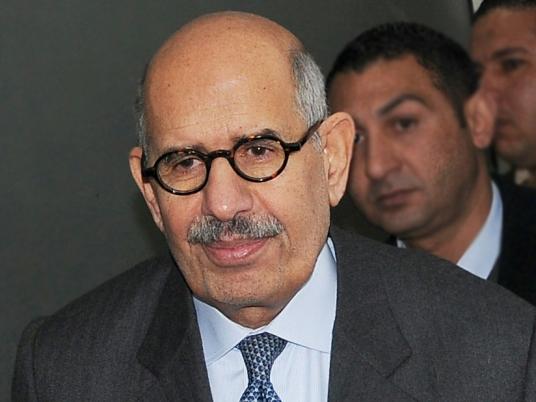Mohamed ElBaradei returned to Egypt at a critical point in the country’s political history. With President Mubarak in power for almost three decades, there is a general feeling that political life is stagnant. Egyptians are looking forward to change, greater freedoms, the devolution of power, and the rule of law–in a word, democracy.
This yearning for change is accentuated by the fact that corruption has penetrated all realms of life, further exacerbating our internal problems. As a result, the regime’s credibility has been severely undermined and people no longer believe any of its promises.
Then along came ElBaradei, the ex-chief of the International Atomic Energy Agency, carrying the banner of change. Popular demands for change do not just express a feeling of dissatisfaction with the government’s performance, but rather a widespread feeling of discontent with political life as a whole.
If the government’s performance falls below popular expectations, that of the opposition has not been any better. The opposition lacks cohesion and most of its parties are torn apart by internal conflicts. Most parties collude with the security apparatus to win seats in parliament or to secure other benefits, all at the expense of political transparency.
Bearing that in mind, the return of ElBaradei seemed to occur at the perfect moment. ElBaradei calls for wholesale change, including the replacement of the current constitution.
Predictably, ElBaradei’s calls for change were not received with open arms, neither by the opposition nor by the government. But the fact that ElBaradei is a political figure with international clout has made it quite difficult to ignore his calls for democratic reform.
It’s understandable why the ruling party rejects ElBaradei’s agenda. His demands threaten to upset the very conditions that for long have secured the ruling party’s firm grip on power.
The opposition, on the other hand, fears that ElBaradei will steal the show. Even though opposition parties raise the banner of change they still have a stake in the existing political system–even if their share of power is limited. The existence of weak opposition parties is desired by the regime, for they give a false impression of political pluralism, which enhances the legitimacy of the regime.
For all these reasons, it’s understandable why ElBaradei’s arrival has irked everyone. ElBaradei exposes the regime and the opposition alike.
ElBaradei was first attacked by writers that support the regime, followed by those from the opposition. The criticisms eventually spilled over into popular opinion.
The regime will not forcefully push ElBaradei to the margins of Egyptian politics, but it will use other tools which are more subtle but just as powerful. It will not ban ElBaradei from traveling, arrest him or accuse him of treason. Instead, it will use legal methods to contain him: It will withhold permits, clamp down on ElBaradei’s supporters, ridicule his demands, and bombard him publicly with all sorts of vexed questions.
“What is your political platform? What will you do with subsidies? What is your policy to encourage investment? Where were you for the past 20 years? What do you know about internal issues? Why do you travel so often outside Egypt?,” they will ask, expecting ElBaradei and his supporters to eventually give up and abandon all hope.
ElBaradei is a troublesome figure for both the government and the opposition. To complicate matters further, he is not interested in pleasing either of the two. His demands express what the vast majority of people want.
Egyptians want change. They want a democratic constitution, legal reform, transparent elections, checks and balances on political power, and an independent judiciary. In short, the problem is not with the players but rather with the rules of the game.
The current regime has not created the atmosphere conducive to democracy. Reforming Egyptian political life requires changing that atmosphere and re-writing the rules of the game.
Translated from the Arabic Edition.



